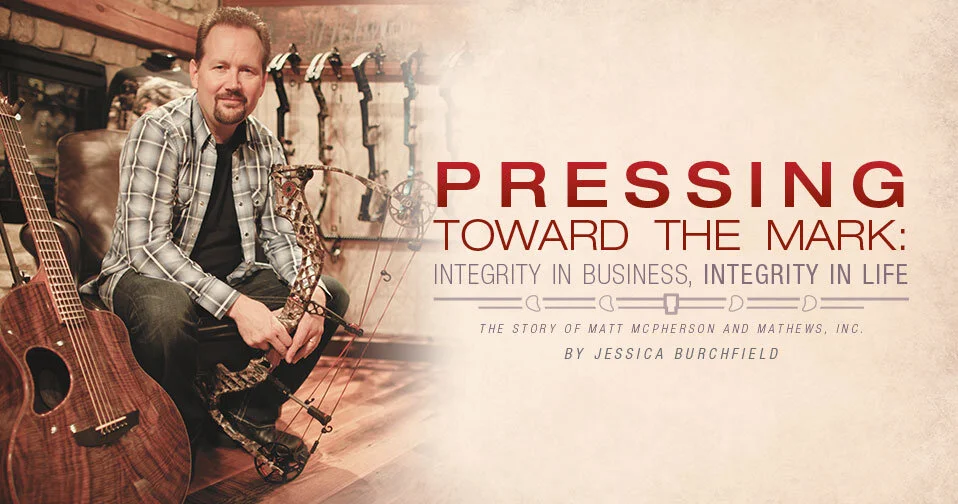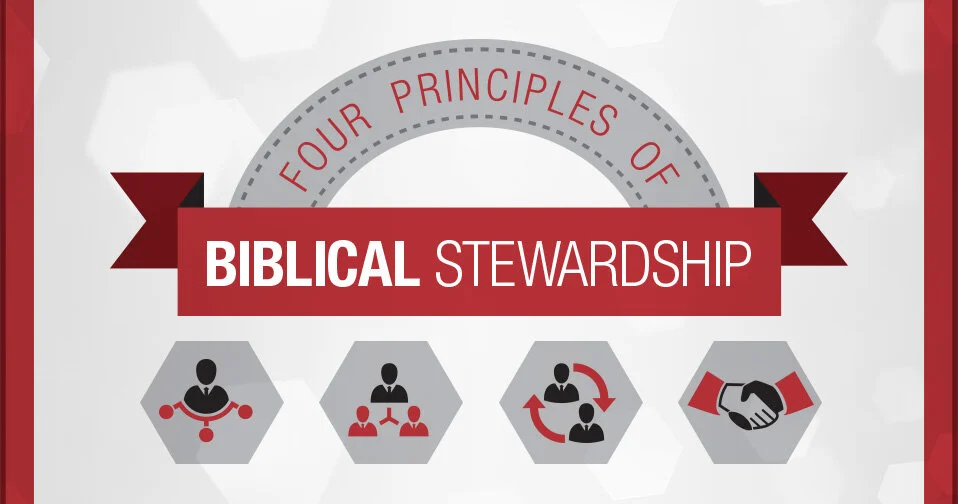Stewardship in an Abundance Economy
— by J.D. Greear
Typical economic theory posits that the way to develop and sustain a healthy economy is by perpetuating a high demand and a low supply for a specific product or service. This kind of scarcity mindset produces attitudes of fear, greed, and aggressive competition among investors and entrepreneurs as they fight for and over perceived limited resources. But how does a gospel-driven lens on ownership and resources moderate this view of economic theory? JD Greear explains that for faith driven investors and entrepreneurs, the truth is that we are stewards in a world created by a God who is generous and provides abundantly. Check out his thoughts on what it means to be a steward in God’s abundance economy:
It's all from God. In Deuteronomy 10, Moses said to the children of Israel, “to the Lord, your God belongs to the heavens, even the highest happiness, the Earth and everything in it.” Paul would agree. In the book of Colossians, he would say that all things—including the breath in our bodies and the talents in our brains—they're all from Jesus. They're given for his purposes, and ultimately, it's his strength that sustains them all, even as we use them. They exist for his purposes and see, if God owns at all, that means that we are stewards. And the most important question we have to ask is what he wants from the things that he has given us. He tells us in 2 Corinthians that when he gives us financial success, for example, that part of the reason that he does that is to increase our potential for impact in his kingdom. In 2 Corinthians 9, Paul says to the Corinthian believers, “God will enrich you in every way to increase your seed for sowing.”
Why does God increase us and give us success? It is to increase our seed for sowing. What that means is that God has a lot more to give. But who is he going to give it to? Is he going to give it to the farmer who hoards it or is he going to give it to the farmer who increases the amount of his sowing? God wants to multiply and bless his people. But he does so under the assumption that his people will use the increase that he gives them to sow more into his kingdom, not just build more of their own kingdoms.
God multiplies our resources to increase our standard of giving, not just our standard of living.
When you understand this, you will see, in fact, that when you don't use your time, treasure, and your talents for God's purposes, you're actually stealing or embezzling God's resources and his money and his opportunity. Think about how upset you would be if you made a huge donation to Feed the Children, for example, and then found out that 90% of your donation went to the CEO so that he could upgrade his house or buy some new cars—that the money that you gave didn't go to feeding the children. You would rightly be outraged because that guy was stealing what wasn't meant for him, but was actually given for a different purpose. In the same way, when we don't use our talents and our opportunities and our resources for the purposes God gave them to us for, then we're stealing from God.
Listen, our enterprise is your enterprise may not all be nonprofits. In fact, we have a lot more for-profit businesses, but all of us should have that posture that what we have built is really what God has built through us. It's from God. And one hundred percent of it ultimately needs to be for God. God has made a donation to our business, and he expects us to steward it the way that he intends. He wants you to use his donations for his purposes. If you sit on them or you use them for your own luxuries, it's like in his mind you're embezzling money, you're stealing from it. We are stewards of God's resources. We are not owners of our own. You see, God did not create a world of scarcity. He created a world of potential abundance. This is a bedrock principle of entrepreneurship. There is not a limited amount of resources out there to fight over.
So, what you have your talents, your resources and faith. Invest wisely. Take strategic risks for the Kingdom of God and give a lot away and watch God multiply you in the New Testament. Jesus consistently praises the stewards who give it away, who invest it widely, creating more value for everybody. And the end result is that there's much more for everyone.
Related articles
When I pray, am I trying to convince God to bless my business? Or am I asking God to lead and direct the business He had provided? The hard reality is that I sometimes ask God to bless the business plans I had established and thinking that was enough.
At its best, business is both purposeful and profitable, dynamic and gainful, commercial and rewarding. Far from being opposites, good business and good behavior go hand-in-hand, and biblical principles can align with best practices.
The “stewardship” demanded of faith-driven business leaders is profoundly different than the “stewardship” urged by the world. The world essentially sees stewardship as being a “good owner”. God commands being a “steward” instead of an “owner”.
Recognition is the primary task of infancy. Feeding, crying, and even sleeping are just the support system for this most essential work of figuring out who we are, and where we are, by making contact with other people, seeing them seeing us, gradually beginning to build our sense of self through their eyes.
When our identity as entrepreneurs is challenged, our relationship with God—the rootedness and permanence of what it means to be a child of God—and all that comes with it, can moderate how we view all of our other (sub) identities, especially our EI.
Generosity isn’t about gaining as much as you can in order to give more away. It isn’t even about giving away everything you have.
The story of Jacob in the Old Testament is a fascinating tale of pride, humility, success, failure and a man who (quite literally) wrestled with the Lord.
Sheeba and I, we've been in prayer from the time that covid hit. Saying, Lord do more than we know to ask or imagine or dream. And we know that you're the God of big things that moves mountains on behalf of the widow and the orphan and those that you love and to build your kingdom.
The concept for the Kingdom Companies Group came from the journey that Katherine and I have experienced in our attempt to operate a business as stewards for the Most High God. As fallen creatures we have done so imperfectly and have learned lessons through our failures.
God gives us capacity because we are not large enough today to fight tomorrow’s battles.
God multiplies our resources to increase our standard of giving, not just our standard of living. Jesus consistently praises the stewards who give it away, who invest it widely, creating more value for everybody.
A modern day Christian Renaissance Man, Matt McPherson is the founder and CEO of both Mathews Inc., the largest bow manufacturer in the world, and McPherson Guitars, a leading name in the music industry for hand-crafted acoustic guitars
GloryBee sits squarely in an interesting cultural nexus: Christian-owned, organic food, Oregon, and committed to environmental sustainability.
Belief in the “Prosperity Gospel”—that God financially blesses faithful followers—does not turn individuals into successful entrepreneurs. But prosperity beliefs can fuel values linked to entrepreneurial thinking, such as power and achievement, according to a Baylor University study.
This article was from a collection of White Papers compiled for attendees of the CEF’s 2019 Global Event. Today, we share Craig Hill’s White Paper — “I have found throughout my life that if I would accept my role as a Kingdom ambassador in business, there are many more opportunities to minister to unbelievers than I have ever had in church or ministry settings.”
What does stewardship look like in our lives today? What does it look like in our businesses? Unfortunately, many Christians today only associate the idea of stewardship with sermons, church budgets and building programs. The idea of biblical stewardship is much more expansive. It is where the concepts of faith, work, and economics intersect.
An article from Scott Rodin’s website “The Steward’s Journey” — Gary Ringger stewards businesses, foundations, nonprofits with hope. He was in his early thirties, the president of a successful agricultural feed company, and a start-up food processing business. He had a wife and three young daughters. But Gary Ringger was experiencing the darkness of depression.
Does aircraft maintenance have anything to do with God's work? Paul and Betty Abbott and their sons Luke and Aaron believe so. The Abbotts took over operations of Covington Aircraft shortly after Paul's graduation from LeTourneau University, know that they were just stewards of a company that belonged to God.
Cheryl Bachelder, former CEO of Popeyes Louisiana Kitchen, Inc. and author of Dare To Serve, shares her thoughts on ownership mentality vs. a stewardship mindset. “What has been entrusted to your care? Are your actions carefully and responsibly stewarding these resources?”
Bubba Watson won the 2012 & 2014 Masters using PING irons, giving John Solheim another reason to smile. Listen here as the CEO of PING shares with LeTourneau Center about the industry & their work to honor God.
Theology of Work Project digs into a famous parable —“One of Jesus’ most significant parables regarding work is set in the context of investments (Matt. 25:14-30). A rich man delegates the management of his wealth to his servants, much as investors in today’s markets do.”
How can you worship God through your work? CEO and Founder of Hobby Lobby, David Green, shares how he uses his God-given talents and resources in business to enlarge God's kingdom and to serve his employees and customers.
Wes Willmer builds us up in his piece: How do we see work and earning in the bigger picture of our Christian faith? He reveals that increasing our impact is not about earning more money, but that it happens when we acknowledge our place in God’s work, when we know ourselves, and when we understand how God views money.
From the LeTourneau Center for Faith and Work, we hear Camcraft’s view of their business in manufacturing high-precision machined components as a gift to them from God, and they see themselves as merely stewards of the business.
At Generous Giving’s annual gathering, John Cortines and Greg Baumer were invited to speak about their book, Through the Needle. The book covers the Harvard MBAs’ struggle to answer - “As young Christians with sky-high earnings potential, what should they plan to do with their money?”
Rev. Dr. Helen Rhee, Professor of Church History at Westmont College & Associate Pastor of Free Methodist Church, adds to our understanding of God’s intent and absolute ownership of the created world and the ramifications for human stewardship. She gives depth to notions of “sufficient care” and “appropriate enjoyment” in a global culture of affluence.
Yesterday on our podcast, you heard a great interview with Alan Barnhart. Within Barnhart Crane & Rigging, which he runs with his brother Eric, a group of employees and spouses decide where to distribute a portion of profits made every year.
Tim Macready, Chief Investment Officer at Christian Super, shares how the superannuation pension fund is on a journey of applying God’s Word to the way they, as Christian professionals, invest their beneficiaries’ assets. This includes learning to be better stewards of creation, looking for ways to promote human flourishing, and seeking to be redemptive in all that they do.
In the video clip today, Henry and panelist Tom Blaisdell discuss permanent capital as a unique and valuable approach for the Christ-centered investor. The panel as a whole highlights the importance of kingdom-minded economics as critical to faith-driven investing.
——
[ Photo by Johnny Martínez on Unsplash ]




























What 1 Timothy 6:9-10 Has to Say to Entrepreneurs about success and the love of money.